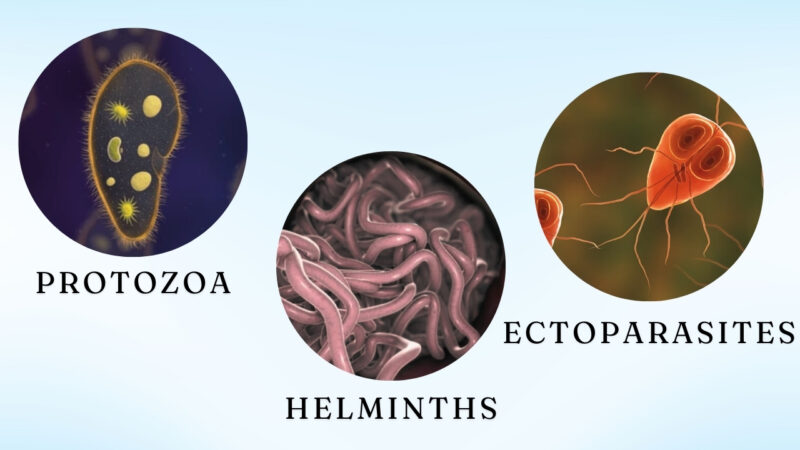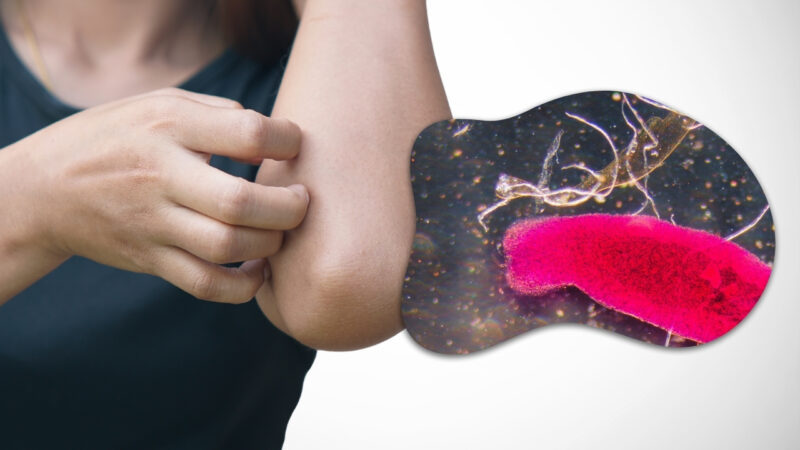Experiencing ongoing symptoms such as stomach cramps, pain, nausea, vomiting, dehydration, weight loss, and digestive issues may indicate the presence of a parasitic infection.
If you find that these symptoms persist despite trying various treatments, it is advisable to schedule an appointment at a healthcare facility.
Parasitic infections can lead to several health complications if left untreated.
Contrary to popular belief, parasites are not confined to underdeveloped regions; they are a global health concern.
These organisms can cause numerous illnesses, impacting more than just the digestive system.
Fortunately, medical advancements have made it possible to effectively treat and eradicate most forms of parasitic infections.
Types of Parasites

- Protozoa: Single-celled organisms like Plasmodium that can multiply only within the host.
- Helminths: Worm-like parasites such as roundworms, pinworms, trichina spiralis, tapeworms, and flukes. For example, Schistosomiasis is caused by a helminth.
- Ectoparasites: These parasites, like lice and fleas, live on the surface of the host rather than inside it.
Common Examples Include
- Roundworms
- Tapeworms
- Pinworms
- Whipworms
- Hookworms
- Lice
- Giardia
- Mosquitos
- Bedbugs
- Scabies
Parasites vary in form and impact. Some consume your food internally, leaving you malnourished despite adequate intake. Others consume your red blood cells, leading to anemia. Some lay eggs that cause itching and can disrupt your sleep, making you irritable as per study from NCBI.
10 Indications You Might Have a Parasite
Skin Irritations

Unexplained skin issues like rashes, hives, rosacea, or eczema could be signs of a parasitic infection. Intestinal parasites can trigger the immune system to produce immunoglobulin E (IgE), an antibody linked to allergic reactions according to Healthline.
This can lead to various skin problems, including chronic itching. In particular, parasites like pinworms can cause itching around the anus.
If you experience persistent itching, rashes, or hives that don’t improve with regular treatment, it’s important to consult a doctor. These symptoms could indicate a parasitic infection that needs to be addressed.
Aftermath of Food Poisoning
If you experienced food poisoning and continued to have digestive issues despite treatment, it could be a clue to a parasitic presence. Persistent digestive problems and weight loss post-food poisoning warrant medical consultation.
Insomnia and Sleep Apnea
Recurring trouble falling asleep or waking up multiple times at night could point to a parasitic invasion. These organisms can cause physical discomfort during the night, disrupting your sleep reported by J. Neurosci. from NCBI.
Unresolved Digestive Issues

If you’re experiencing unexplained constipation, diarrhea, gas, bloating, nausea, or vomiting, these could be signs of a parasite infection.
Rasoul Mohammadi says that parasites often settle in your gastrointestinal (GI) tract, causing your immune system to react. Depending on the type of parasite and your body’s response, symptoms can vary widely.
Common symptoms include watery or bloody diarrhea, bloating, gas, and constipation, as experts suggest these can all indicate a parasitic presence.
Iron Deficiency or Anemia
Certain parasites can cause iron-deficiency anemia by consuming your red blood cells or causing blood loss through your stool. This can result in iron deficiency, presenting various health complications.
Constant Hunger
Parasites can cause persistent hunger and an inability to feel full, especially when this is paired with unexplained weight loss. For example, Tapeworms, live in the stomach and absorb the nutrients from the food you eat, leaving you feeling constantly hungry no matter how much you consume.
In some cases, parasites may even trigger cravings for specific foods. If the parasite depletes your body of key nutrients like salt or sugar, you might find yourself craving more of these to compensate. These organisms rely on your body’s nutrients to survive, which means they essentially feed off the energy and nourishment you’re trying to take in for yourself, leading to increased cravings.
Teeth Grinding (Bruxism)

The toxins released by intestinal parasites can lead to anxiety and mood changes, contributing to nighttime teeth grinding.
Muscle and Joint Pain
These organisms can infiltrate joint spaces, releasing inflammatory toxins that impact movement. Trichinosis, caused by roundworms, is one example that affects muscles.
Traveler’s Diarrhea
Changes in location, weather, food, and water can introduce your system to unfamiliar bacteria, which can disrupt your digestive balance. Diarrhea is the body’s natural response to clear out toxins or foreign organisms in the gastrointestinal (GI) tract according to this study.
In places like airplanes, restaurants, and hotels, you can’t always control the cleanliness or conditions that might affect your digestion. Diarrhea is often the stomach’s way of expelling something that doesn’t agree with it. However, if the diarrhea persists and the usual remedies aren’t helping, it might be a sign of a parasite in your system.
Chronic Fatigue
A parasitic infection can take a serious toll on your body, leaving you feeling constantly exhausted and even affecting your mood. Symptoms like mood swings, feelings of apathy, and fatigue can persist, even when you’re getting enough rest.
Certain parasites, such as Giardia, can lead to chronic fatigue syndrome by causing nutrient deficiencies and impairing the absorption of important nutrients like iron and vitamin B12.
Extreme fatigue or a lingering energy slump is often a sign of a parasitic infection. If you’re feeling persistently exhausted, it’s crucial to consult a doctor for a proper diagnosis and treatment plan.
Absence of Symptoms
Some parasitic infections can be asymptomatic, making them difficult to detect. Despite the lack of symptoms, the presence of a parasite can still affect your health. Regular medical check-ups are crucial if you suspect an infection, even without clear symptoms.
How Do You Get Parasites?

Parasites can invade your body through various means. They often enter via the mouth or skin but can also spread in other ways.
You can get a parasite by:
- Consuming contaminated food
- Eating undercooked meat
- Drinking contaminated water
- Eating unclean or contaminated fruits and vegetables
- Walking barefoot in the dirt
- Swimming in infected lakes, ponds, or creeks
- Handling animals
- Shaking hands with people who do not wash their hands after handling animals or using the bathroom
- Overseas traveling
If infected, a person can leave eggs on anything they touch, such as phones, salt shakers, door handles, or menus, which can spread to others.
How to Test for Parasites
Blood tests can identify parasites in the bloodstream.
Comprehensive stool tests analyze fecal samples for signs of infection. Imaging techniques such as X-rays, MRI scans, and procedures like endoscopy and colonoscopy provide further insights.
Various other forms of parasite tracking tools are also used to accurately detect these harmful organisms.
Treatment Options

Medication
To combat parasitic infections, your doctor will prescribe the most suitable anti-parasitic drugs. These may include albendazole, mebendazole, or pyrantel pamoate as it is stated in NCBI research.
Identifying the specific parasite through stool tests or biopsies helps to tailor the medication more effectively. Dosages might range from a single dose to several weeks of treatment. Adherence to the prescribed regimen is crucial for the complete eradication of the parasites.
Alternative Therapies
While traditional medical treatments are highly effective, alternative methods can offer additional support. Combining these therapies with conventional medicine may enhance overall treatment effectiveness. It’s essential to consult with your healthcare provider to identify the parasite before starting any alternative treatments.
Probiotics
Incorporating probiotics can help prevent parasite growth and infections. Commonly recommended probiotics include:
- Lactobacillus acidophilus
- Lactobacillus plantarum
- Saccharomyces boulardi bifidobacteria
Adding these bacteria to your diet can create an environment that is less hospitable for parasites, aiding the body’s natural defenses.
How to Get Rid of Parasites
To fight and eliminate parasites effectively, there are several steps you can take. First, avoid simple carbohydrates found in refined foods, fruits, juices, dairy products, and sugars, as parasites thrive on these substances. Regular fasting and cleansing routines can help starve and eliminate parasites more quickly.
Incorporating specific foods into your diet can also be beneficial. Raw garlic, pumpkin seeds, pomegranates, beets, and carrots are known to kill parasites. Drinking plenty of water is essential, as it helps flush out your system and remove unwanted organisms.
Eating more fiber can aid in the removal of worms. Additionally, including vitamin C and zinc in your diet can bolster your immune system. However, consult your doctor before making significant changes to your vitamin intake.
Managing stress is crucial. Chronic stress can weaken your immune system, making it harder to fight off parasites. Focus on your gut health as a key strategy to eliminate these organisms. Digestive enzymes can restore your intestinal tract to its normal state, creating an unfriendly environment for parasites.
Herbal remedies can also strengthen your body and help eliminate parasites. However, consult your healthcare provider before incorporating any herbs to ensure they are appropriate for your specific condition.
Related Posts:
- Guillain Barré Syndrome Explained: Symptoms, Causes,…
- How Entamizole Helps Relieve Stomach Pain - Uses Explained
- What Is the Altemeier Procedure for Anastomosis? -…
- Can Hernias Affect Your Back? 9 Key Facts to Know
- 10 Key Steps to Complete Before Earning a Medical…
- What is Incarcerated Hernias? - Causes, Symptoms,…















